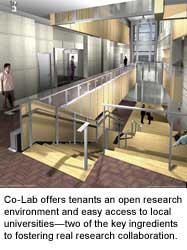The new four-story building rising out of Junction Hollow can stake a solid claim in the region as one of the hotbeds for information technology research.

That’s because the tenant list for the Collaborative Innovation Center features Intel Research Pittsburgh, Carnegie Mellon CyLab, the nation’s largest academic center for cybersecurity-related research and education, and the Software Engineering Institute’s Network Systems Survivability (NSS) program, which includes the world-renowned CERT Coordination Center (CERT/CC).
Todd Mowry, director of Intel Research Pittsburgh, said his team of scientists and student researchers are enthusiastic about the move from their Craig Street digs. The move certainly fits the lab and Intel’s recipe for success.
“A founding principle of the Intel research lablets is an open and collaborative research environment. The second key ingredient to fostering real research collaboration with a university is physical proximity to its faculty and students.
“We are thrilled to be moving into the Collaborative Innovation Center, where we couldn't possibly be any closer to the world-class researchers at Carnegie Mellon University,” said Mowry, an associate professor of computer science and one of Tech Review Magazine’s top 100 young innovators.
Intel Research Pittsburgh is one of four labs created by Intel Corp. Each lab was founded close to major universities so that scientists could pursue open collaborative research projects to accelerate the development of new computing and communications technologies.

Since its founding two years ago, Intel Research Pittsburgh has advanced this mission with Internet Suspend/Resume, a project in personal computing mobility, IrisNet, a project in wide-area sensing, and the Diamond Project, an interactive search of complex data.
The growth and impact of security research at the university brings a host of cybersecurity researchers to the new facility. The potential for synergies is tremendous. University faculty and scientists already partner with the Software Engineering Institute's technical staff on a regular basis. Now, many will be together under one roof.
More than 130 NSS staff members from the Software Engineering Institute who conduct training, education and research programs, as well as members of the CERT/CC, are moving to the Collaborative Innovation Center, along with a cohort of scientists from Carnegie Mellon CyLab, who will be tackling some of the world's security issues.
The new building “gives the university much needed growing room and provides CyLab researchers with state-of-the-art labs for ongoing initiatives," says Pradeep K. Khosla, co-founder of Carnegie Mellon CyLab.
A university-wide, multidisciplinary initiative, CyLab builds on more than two decades of Carnegie Mellon leadership in information technology and involves faculty, students and staff from six university departments.
CERT/CC, which provides the backbone for the Department of Homeland Security's U.S. CERT efforts, is a CyLab partner. Khosla and Richard Pethia, director of the NSS program for the Software Engineering Institute, are CyLab co-founders.
Related Links:
Collaborative Innovation Center
Intel Research Pittsburgh
Carnegie Mellon CyLab
Software Engineering Institute
Network Systems Survivability
CERT Coordination Center
Todd Mowry
Pradeep Khosla



